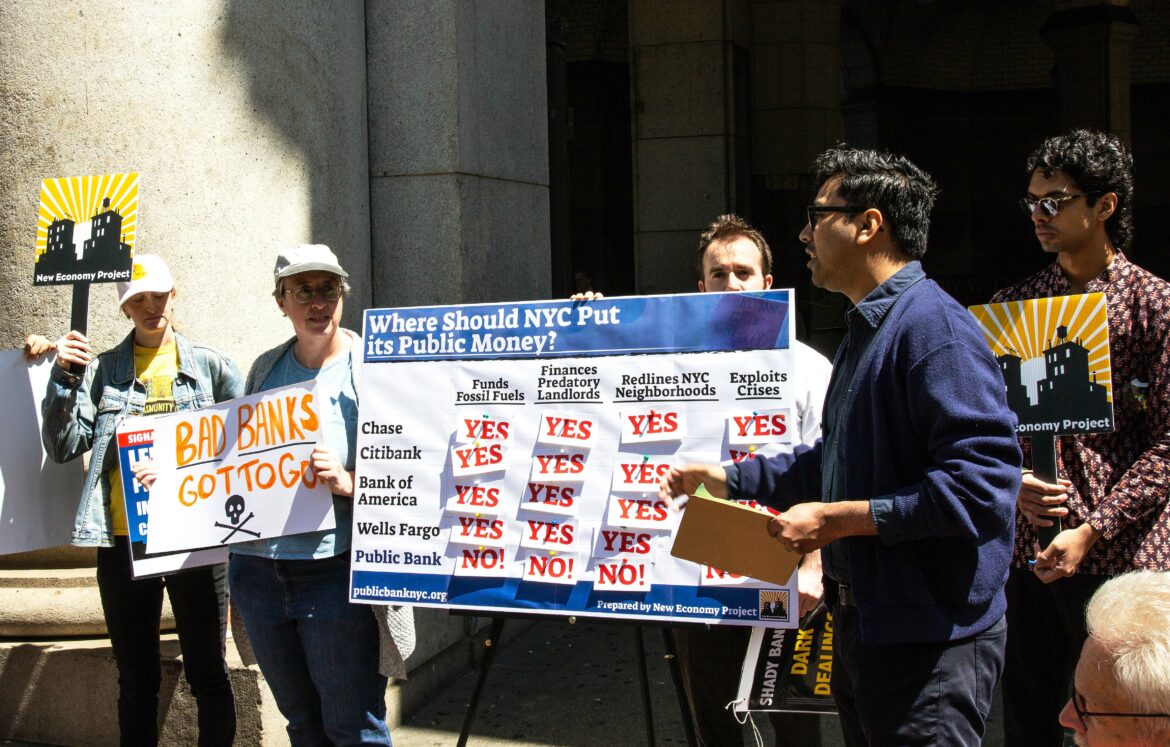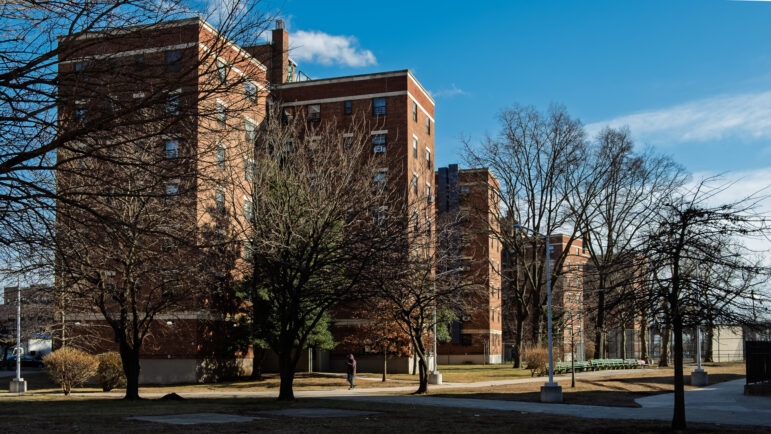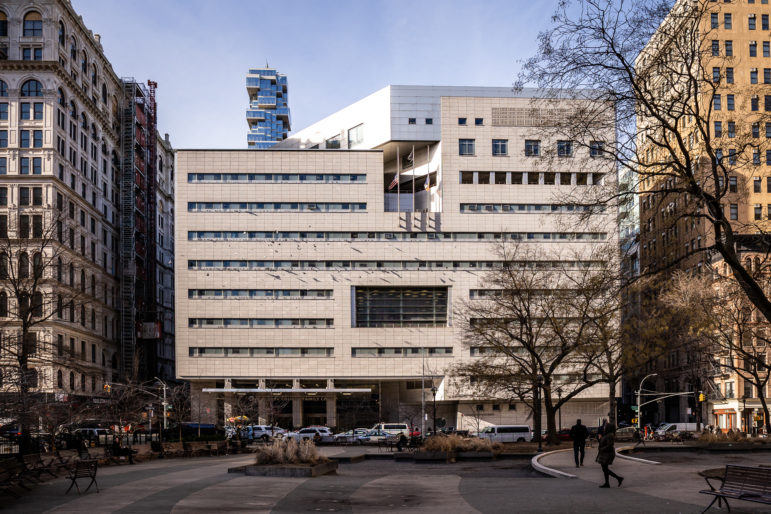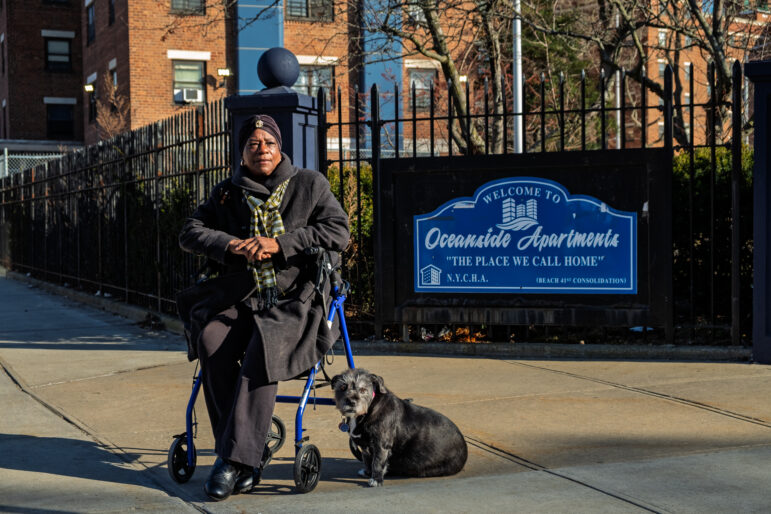“Redirecting our public funds to a public bank would enable the city to divest from banks that harm New Yorkers, and invest in tenant-owned housing, community land trusts, worker cooperative small businesses, and green energy projects—leveraging our tax dollars to strengthen communities rather than prey on them.”

Doug Turetsky
Advocates with the New Economy Project at a press conference in 2023 calling for the creation of a public bank.Tenant harassment is so pervasive in New York City that practically every New Yorker has a story to tell—whether their own or someone else’s—about landlords cutting corners, raising rents, or skirting the law. What New Yorkers might not know, however, is that behind every slumlord harassing and neglecting tenants is a bank fueling these practices, reaping profits from the suffering of New Yorkers. While landlords are the face of this extractive system that thrives on high rents and neglect, banks play a fundamental role in driving our affordability crisis.
With mayoral campaigns in full swing, it’s time for the city’s leadership to stop letting banks off the hook and demand accountability. A public bank—created by the city and chartered to serve the public interest—could be the key to transforming this broken system into one that puts people over profits. Public banks hold public deposits and reinvest in community needs, like affordable housing, small business development, sustainable infrastructure, and more.
The fact is, most landlords couldn’t do anything without gobs of cash handed out by commercial banks, in the form of mortgages, renovation loans, and lines of credit. These banks aren’t just passive lenders—they are active enablers, fueling a system that prioritizes profits over safe, affordable housing.
Consider the failed Signature Bank, whose business model was built on speculative and often predatory practices. As one report put it, Signature routinely financed “real estate companies that are known for large purchases of rent-stabilized multifamily housing and who made aggressive attempts to deregulate those buildings.” These financial practices take a devastating toll on tenants, forcing them to flee or live through constant disruptive construction, mass eviction filings, rent increases, and worse.
Despite the requirements of the Community Reinvestment Act, which is supposed to hold them accountable for serving low- and moderate-income communities, banks eagerly accept landlords’ claims that buildings with affordable rents can magically transform into cash machines generating massive profits. Banks then generously give them millions of dollars, willfully and repeatedly ignoring the devastating consequences for tenants, not least the ensuing harassment and neglect. The word for this is collusion—an unspoken alliance between predatory landlords and banks that fuels gentrification, displacement, and inequality.
For example, tenants in the Lower East Side’s Tenants Taking Control Coalition were outraged to find that their notorious landlord, Rafi Toledano—since banned from real estate—was backed by Madison Realty Capital with a loan from Signature Bank. At the time, Signature was one of the city’s ‘designated banks’ and held a portion of its public deposits—including tax dollars collected, at least in part, from these same city residents. In effect, the tenants’ own money was being used to fund the harassment they endured.
This is just one of the many ongoing injustices sparking a growing citywide movement for public banking—a transformative alternative to allowing private banks to hold and profit from our public money. These funds represent a massive resource that banks leverage to finance their investments, which not only include destructive ventures like speculative real estate and predatory landlords, but also other exploitative industries like fossil fuels.
Redirecting our public funds to a public bank would enable the city to divest from banks that harm New Yorkers, and invest in tenant-owned housing, community land trusts, worker cooperative small businesses, and green energy projects—leveraging our tax dollars to strengthen communities rather than prey on them.
We no longer have to rely on Wall Street banks to hold our money. Successful models, like the century-old Bank of North Dakota, demonstrate the power of public banking to help create a future where communities thrive instead of being exploited. New York City must put tenants first by creating a public bank that prioritizes affordable housing and community well-being over corporate profits.
Jodie Liedecker is lead organizer at Cooper Square Committee, an affordable housing and tenant rights group on the Lower East Side.









One thought on “Opinion: Wall Street Fuels Predatory Real Estate. It’s Time for a Public Bank Alternative”
A banking version of NYCHA? LOL! Of course the idiots want this.